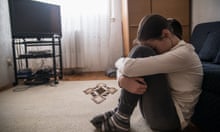A council in England has paid £60,000 a week – the equivalent of £3.12m a year – for a “wholly unsuitable” children’s home placement for an autistic teenager with a mild learning disability.
The judge hearing the girl’s case was so appalled that he ordered the education secretary, Nadhim Zahawi, to explain the government’s position on what he called a “national crisis” – the severe shortage of secure placements for vulnerable children with complex needs.
The case, first reported by the open justice court of protection project, involves a girl who spent at least five months alone in the locked annexe of a children’s home. She was cared for by six dedicated members of staff while her local authority tried and failed to find a home that would better meet her needs.
The council told the court of protection it had approached several hundred providers nationwide but no one was willing to take her.
The girl had been in care since June 2019, after her mother could not cope, and had lived in at least 15 different settings since then. The court heard she had a history of violence towards her carers and last year was hospitalised after being continuously awake and “experiencing mania” for 72 hours, during which she gained access to the roof of her care home and threatened to kill herself.
She threw boiling water from a kettle over staff caring for her and threw nail polish remover into the eyes of a carer, saying she wanted to blind them. She armed herself with knives and parts from a broken bed and threatened staff. She set fire to a tea towel, saying she wanted to burn the house down.
Though she did not need medical care and was assessed as not meeting the criteria for detention under the Mental Health Act 1983, she ended up in a hospital bed in accident and emergency because the children’s home would not take her back.
A judge authorised her deprivation of liberty in a secure placement, but the only one the council could find cost £60,000 a week. A barrister for the local authority described it as “a staggering cost, which has come about through there being a complete lack of alternative resources”, the open justice court of protection project reported.
The placement was “wholly unsuitable” and left her isolated, the barrister acknowledged.
Keeping the girl and her carers safe had been a constant battle, the court heard. Last year the teenager was arrested after she attacked a staff member. In a police cell she hit her head and pushed her acrylic fingernails up her nose to draw blood, which she spat around the cell.
Mr Justice Poole, who has dealt with the case several times, said in a hearing: “This case is reflective of a national crisis. Support from central government is needed.”
He gave permission for relevant case papers to be disclosed to NHS England and to the education secretary “with a view they each are invited to provide information and witness statements to the court”.
Zahawi wrote to the court through the local authority involved to put forward his position, the Guardian understands.
The Department for Education did not answer when asked what the education secretary’s position was. A spokesperson said: “All children and young people deserve to grow up in stable, loving homes. We commissioned an independent review of children’s social care, which will set out to radically reform the system, and are working hard to raise standards for children in care while it continues. We are also taking forward urgent reforms to address pressures in the sector, including providing £259m to maintain capacity and expand provision in secure and open children’s homes.”
The Guardian understands that the girl has recently moved to a more suitable placement in rented accommodation, with the same team of carers, and that the care cost has reduced to £33,000 a week (£1.71m a year).
Rachel de Souza, the children’s commissioner for England, said the girl was suffering as a result of a “systemic failure to plan cohesively and locally for children in care”. She added: “Unfortunately, I am seeing more and more cases like this. I appreciate the shock generated at the amount of money involved here, though the problem runs far deeper than the money involved. This is about children’s lives being repeatedly and continuously turned upside down when they are most vulnerable because we have not invested in quality places for them to live.
“What I want to see is a total rethink about how we provide this type of care. Now, the system relies on councils buying beds in children’s homes, some of which are good, some of which are not. The child is then expected to fit in with the home and evicted if their needs change. This puts the onus on the child.
“I want to see more locally run homes, which are flexible enough in their approach that children can stay put even as their needs change.”









